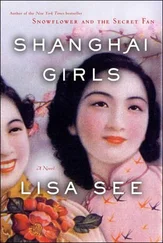Lisa See - Peony in Love
Здесь есть возможность читать онлайн «Lisa See - Peony in Love» весь текст электронной книги совершенно бесплатно (целиком полную версию без сокращений). В некоторых случаях можно слушать аудио, скачать через торрент в формате fb2 и присутствует краткое содержание. Жанр: Старинная литература, на английском языке. Описание произведения, (предисловие) а так же отзывы посетителей доступны на портале библиотеки ЛибКат.
- Название:Peony in Love
- Автор:
- Жанр:
- Год:неизвестен
- ISBN:нет данных
- Рейтинг книги:4 / 5. Голосов: 1
-
Избранное:Добавить в избранное
- Отзывы:
-
Ваша оценка:
- 80
- 1
- 2
- 3
- 4
- 5
Peony in Love: краткое содержание, описание и аннотация
Предлагаем к чтению аннотацию, описание, краткое содержание или предисловие (зависит от того, что написал сам автор книги «Peony in Love»). Если вы не нашли необходимую информацию о книге — напишите в комментариях, мы постараемся отыскать её.
Peony in Love — читать онлайн бесплатно полную книгу (весь текст) целиком
Ниже представлен текст книги, разбитый по страницам. Система сохранения места последней прочитанной страницы, позволяет с удобством читать онлайн бесплатно книгу «Peony in Love», без необходимости каждый раз заново искать на чём Вы остановились. Поставьте закладку, и сможете в любой момент перейти на страницу, на которой закончили чтение.
Интервал:
Закладка:
I thought of the young man I’d met. He hadn’t touched me, but sitting there on the women’s side of the screen I could admit that I’d wanted him to. Out onstage, Liniang died. Mourners gathered to sing of their grief, while her parents keened with unhappiness. And then, in a sudden twist, a messenger arrived with a letter from the emperor. I didn’t like this part of the story very much. Prefect Du was promoted. A huge celebration began, which now, as I saw it, was a great spectacle and a wonderful way to end the evening. But how could the Dus forget their grief so easily if they loved their daughter as much as they said they did? Her father even forgot to dot her ancestor tablet, which would cause her much trouble in the afterworld.
Later, lying in bed, I found myself filled with a longing so deep I could barely breathe.
( 1 7 )

Bamboo-and-Lacquer Cage
my g randmoth e r was ve ry muc h on my m i nd th e next morning. I felt torn between the desire to meet my stranger again tonight and the lessons that had been drilled into me since childhood about how I should behave. I dressed and set out for the ancestral hall. It was a long walk, but I took in everything as though I hadn’t seen it all ten thousand times before. The Chen Family Villa had great halls, vast courtyards, and lovely pavilions that spread down to the shore of West Lake. The wild ruggedness of our rockeries reminded me of what was enduring and strong in life. I saw the expansiveness of lakes and meandering rivers in our artificial ponds and streams. I experienced forests in our carefully planted stands of bamboo. I passed our Gathering-Beauty Pavilion, an upstairs viewing perch that allowed the unmarried girls in our household to watch for visitors in the garden without being detected. From there, I’d heard sounds from the outside world, the trill of a flute floating across the lake, pushed across the water, and insidiously sneaking over our garden wall and onto our property. I’d even heard outside voices: a vendor calling out cooking utensils for sale, an argument between boatmen, the soft laughter of women on a pleasure boat. But I had not seen them.
I entered the hall where we kept my family’s ancestor tablets. The tablets—slips of wood inscribed with the names of my ancestors written in gilded characters—hung on the walls. Here were my grandparents, great-uncles and great-aunts, and countless cousins, many times removed, ( 1 8 )
who had been born, lived, and died in the Chen Family Villa. At death, their souls had separated into three parts and gone to new homes in the afterworld, the grave, and their ancestor tablets. Looking at the tablets, I could not only trace my family back more than nine generations, I could prevail upon the bit of soul that resided in each one to help me.
I lit incense, knelt on a pillow, and looked up at the two large ancestor portrait scrolls that hung on the wall above the altar table. On the left was my grandfather, an imperial scholar who had brought great dignity, security, and wealth to our family. In the painting, he sat in his robes, his legs spread, a fan open in one hand. His face was stern, and the skin around his eyes was wrinkled from wisdom and worry. He died when I was four, and my memory of him was of a man who preferred silence from me and had little tolerance for my mother or for the other women in our household.
To the right of the altar table in another long scroll was my father’s mother. She also wore a severe expression. She had a position of great honor, in our family and in the country, as a martyr who’d died in the Cataclysm. In the years leading up to her sacrifice, my grandfather had served as the Minister of Works in Yangzhou. My grandmother left the Chen Family Villa here in Hangzhou and traveled two days by boat and by palanquin to live with him in Yangzhou. Not realizing disaster was coming, my parents went to Yangzhou for a visit. Soon after they arrived, the Manchu marauders invaded.
Whenever I tried to talk to Mama about that period, she would say,
“You don’t need to know about it.” Once, as a five-year-old, I’d been impudent enough to ask if she’d seen Grandmother Chen die. Mama slapped me so hard I fell to the ground. “Don’t ever speak to me about that day.” She never hit me again, not even during my footbinding, and I never again asked her about my grandmother.
Others, however, invoked her almost daily. The highest goal a woman could achieve in life was to be a chaste widow who would not accept a second marriage, not even if it meant taking her own life. But my grandmother had done something even more extraordinary. She elected to kill herself rather than give herself to the Manchu soldiers. She was such an exemplary example of Confucian chastity that, once the Manchus established the Qing court, they selected her to be venerated in stories and books for women to read, if they hoped to reach perfection themselves as wives and mothers, and to promote the universal ideals of loyalty and filial piety. The Manchus were still our enemy, but they used my grandmother, and the other women who had sacrificed themselves during the ( 1 9 )
disaster, to win our respect and bring back order to the women’s chambers.
I placed offerings of flawless white peaches on her altar.
“Do I meet him or not?” I whispered, hoping she would guide me.
“Help me, Grandmother, help me.” I dropped my forehead to the floor in obeisance, looked up at the portrait to let her see my sincerity, and dropped my head again. I rose, smoothed my skirt, and left the room, my wishes floating to my grandmother on trails of incense smoke. But I felt no surer of what I should do than when I’d entered.
Willow waited for me outside the door.
“Your mother says you’re late for breakfast in the Spring Pavilion,” she said. “Give me your arm, Little Miss, and I will take you there.”
She was my servant, but I was the one who obeyed.
By now the corridors bustled with activity. The Chen Family Villa was home to 940 fingers: 210 fingers belonged to my direct blood relatives, 330
fingers to the concubines and their children—all girls—and another 400
fingers to our cooks, gardeners, wet nurses, amahs, maids, and the like.
Now, with the Double Seven festival, we had many more visiting fingers.
With so many people in the household, our compound was designed to keep each of those fingers in its appropriate place. So this morning, as every morning, our household’s ten concubines—and their twenty-three daughters—ate in their own hall. Three cousins, who were at critical points in their footbinding, were confined to their rooms. Otherwise, the women in the Spring Pavilion sat according to rank. My mother, as the wife of the eldest brother, had the position of honor in the room. She and her four sisters-in-law sat at one table, five little cousins sat at another table with their amahs, while the three cousins my age and I had a table to ourselves. Our guests were also grouped by age and station. In the corner, amahs and wet nurses cared for the babies and girls under five years old.
I swayed with a flawless lily gait, moving gently across the floor, careful with my steps, my body shivering from side to side like a flower in the breeze. When I sat down, my cousins didn’t acknowledge me, conspicu-ously leaving me out. Ordinarily I didn’t mind too much. I was already engaged to be married, I would tell myself, and had only five more months of their company. But after my encounter in the Riding-the-Wind Pavilion last night, I questioned what lay ahead of me.
My father and my future husband’s father had been boyhood friends.
Читать дальшеИнтервал:
Закладка:
Похожие книги на «Peony in Love»
Представляем Вашему вниманию похожие книги на «Peony in Love» списком для выбора. Мы отобрали схожую по названию и смыслу литературу в надежде предоставить читателям больше вариантов отыскать новые, интересные, ещё непрочитанные произведения.
Обсуждение, отзывы о книге «Peony in Love» и просто собственные мнения читателей. Оставьте ваши комментарии, напишите, что Вы думаете о произведении, его смысле или главных героях. Укажите что конкретно понравилось, а что нет, и почему Вы так считаете.












